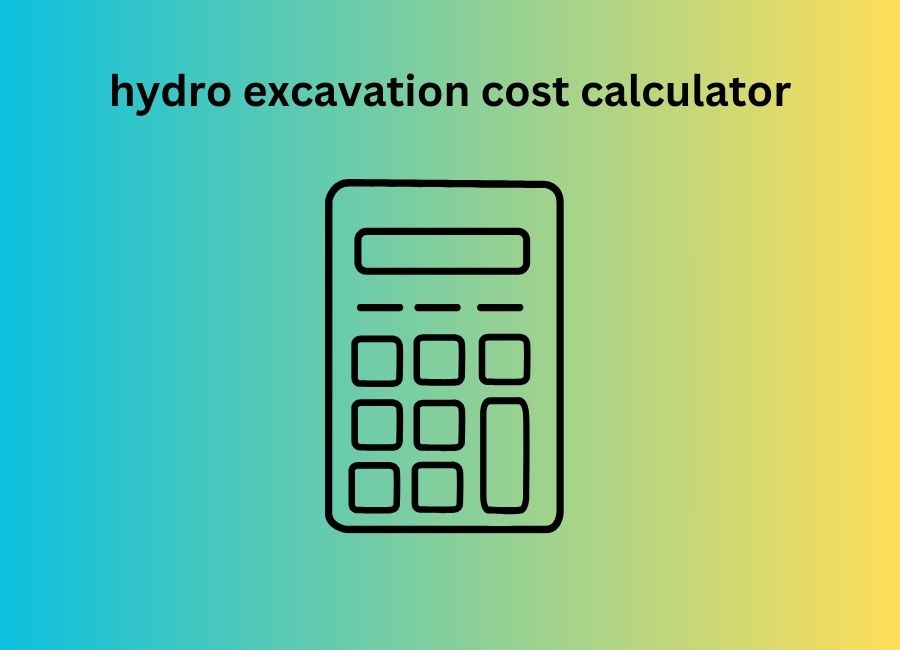Hydro Excavation Cost Calculator
Hydro excavation, a process that uses high-pressure water and a vacuum system to safely and efficiently remove soil and debris, has become an invaluable method for a wide variety of excavation projects. This technique is especially useful for projects that require minimal disruption to the surrounding area, such as utility line installations, digging around sensitive infrastructure, or when working in congested or environmentally sensitive spaces.
For businesses or individuals considering hydro excavation services, it’s important to understand the factors that affect the overall cost. A Hydro Excavation Cost Calculator can help estimate the expenses involved based on various project details.
In this article, we will explain how a Hydro Excavation Cost Calculator works, the key factors that influence the cost of hydro excavation services, and how to use the tool to get an accurate estimate for your project.
What Is a Hydro Excavation Cost Calculator?
A Hydro Excavation Cost Calculator is an online tool that helps estimate the total cost of hydro excavation for specific projects. It takes into account various variables such as the scope of the job, location, soil type, equipment requirements, and time needed to complete the excavation. By inputting the relevant project details into the calculator, users can receive an estimate of the cost, which includes factors like labor, materials, equipment, and any additional services needed.
These calculators are typically offered by hydro excavation service providers, as well as independent platforms that give an unbiased overview of pricing trends and factors.
Why Use a Hydro Excavation Cost Calculator?
Using a Hydro Excavation Cost Calculator provides several key benefits for those planning excavation projects:
- Accurate Budgeting: The cost calculator offers a quick way to understand the financial requirements of the project, which helps in planning and allocating resources effectively.
- Transparency: The tool gives users a breakdown of the cost components, which helps them understand what they are paying for and why.
- Comparison of Providers: By estimating the costs using different service providers, users can compare prices and service offerings.
- Efficient Planning: With an accurate cost estimate, you can better plan the timing, scope, and logistics of the project.
Key Factors That Influence Hydro Excavation Costs
Several factors contribute to the overall cost of hydro excavation services. Understanding these variables will help you use a Hydro Excavation Cost Calculator effectively and get a more accurate estimate.
1. Project Size and Scope
The size and scope of the excavation project play a critical role in determining the cost. Larger projects that require extensive digging and more water usage will naturally cost more. Factors to consider include:
- Excavation Depth and Volume: The deeper and more expansive the excavation, the more water and time it will take, which increases costs.
- Number of Holes or Digging Locations: Projects that require multiple holes or digging locations (e.g., for utility line installations) will require more labor and time, increasing costs.
- Complexity of the Work: More complex jobs that require working around obstacles like utility lines, trees, or other infrastructure may take longer and require more skilled labor, which will drive up costs.
2. Soil Type and Conditions
The type of soil being excavated significantly affects the cost. Different soil types require different levels of effort for excavation, and harder or denser materials can increase both the time and equipment needed for the job.
- Soft Soil: Soft or sandy soils are easier to excavate and generally cost less.
- Hard or Rocky Soil: Excavating through dense or rocky soils requires more powerful equipment and might involve more water, increasing the cost.
- Frozen Ground: If the ground is frozen, it may require additional effort or specialized equipment, which can raise the price.
3. Location and Accessibility
The location of the excavation project will also impact the cost. Excavating in areas that are easily accessible with standard equipment is less expensive compared to hard-to-reach locations.
- Remote or Difficult Locations: Projects located in remote or difficult-to-reach areas may require specialized equipment or additional transportation, which increases costs.
- Urban or High-Traffic Areas: If the excavation is taking place in an urban environment or an area with high traffic, the cost may rise due to logistical challenges, permits, and potential traffic control.
4. Equipment and Water Usage
The type of equipment required for hydro excavation impacts the overall cost. Most hydro excavation projects use high-pressure water systems combined with vacuum trucks. The larger the equipment needed to handle the scale of the job, the more expensive the service will be.
- Small Equipment: Small-scale projects may only require a single vacuum truck and a small water system, which can lower the overall price.
- Heavy Duty Equipment: Larger projects or jobs requiring greater pressure may necessitate heavier equipment, increasing the cost.
5. Labor Costs
Labor is a significant component of hydro excavation pricing. Labor rates can vary depending on the complexity of the job, the required skill level, and the geographic location. Some jobs may require specialized labor to handle more sensitive equipment, while others may only need general excavation personnel.
Labor costs typically range from $50 to $150 per hour, depending on location and expertise.
6. Duration of the Project
The longer the project takes, the more it will cost. The duration is affected by factors such as the excavation area, soil conditions, and complexity of the work.
- Short-Term Projects: Small jobs (like digging a few test holes or trenching) can usually be completed in a day or two, and therefore cost less.
- Long-Term Projects: Larger excavation jobs that span over multiple days or weeks will naturally cost more due to extended labor, equipment use, and water requirements.
7. Post-Excavation Services
Some hydro excavation projects may require additional services, such as backfilling, landscaping, or disposal of excavated material. These services will add to the overall cost.
How to Use a Hydro Excavation Cost Calculator
To use a Hydro Excavation Cost Calculator, you need to input specific details about your project. Here’s a step-by-step guide:
Step 1: Input Project Size and Scope
- Enter the size of the area to be excavated, including the depth and volume of soil that needs to be removed.
- Specify the number of holes or excavation points if applicable.
Step 2: Select Soil Type
- Choose the type of soil (soft, medium, hard, rocky, frozen) to get an accurate estimate of how the soil conditions will impact the excavation costs.
Step 3: Provide Location Details
- Include the project’s location, noting whether it’s in an urban or rural setting and whether accessibility is an issue.
- Consider any traffic control or logistical considerations that might increase the cost.
Step 4: Choose Equipment and Water Requirements
- Indicate if the project requires specialized equipment or larger water pressure systems. Larger projects may require heavier equipment, while smaller jobs can use smaller systems.
Step 5: Enter Labor and Duration Details
- Estimate the duration of the project and labor hours required. Some calculators may allow you to input hourly labor rates or give default estimates based on project complexity.
Step 6: Add Post-Excavation Services
- If additional services like backfilling, material removal, or disposal are needed, input these requirements into the calculator.
Step 7: Generate the Estimate
- Once all details are entered, the calculator will provide an estimate for the total cost of the hydro excavation project. This estimate will likely include a breakdown of costs for equipment, labor, materials, and any additional services.
Example of Hydro Excavation Cost Calculation
Let’s consider an example for a hydro excavation project:
- Project Size: Excavating 1,500 cubic feet of soil, digging 5 test holes.
- Soil Type: Medium clay.
- Location: Urban area with high traffic.
- Equipment: Standard vacuum truck and water system.
- Labor Costs: 2 workers for 8 hours at $75 per hour.
- Post-Excavation: Soil disposal.
Cost Breakdown:
- Excavation (1,500 cubic feet of soil): $2,500
- Labor (2 workers x 8 hours x $75/hour): $1,200
- Equipment (Vacuum truck and water system): $1,000
- Post-Excavation (Soil disposal): $300
- Total Estimated Cost: $5,000
Conclusion
A Hydro Excavation Cost Calculator is an invaluable tool for estimating the costs of hydro excavation services. By taking into account factors such as project size, soil type, location, equipment, and labor, the calculator provides an estimate of the total cost for your excavation project. This helps with budgeting and ensures you understand what the final cost may be.
For an accurate estimate, it’s also recommended to contact hydro excavation service providers for quotes based on your specific project needs. This will ensure you get the most accurate pricing and choose the right service for your project.

